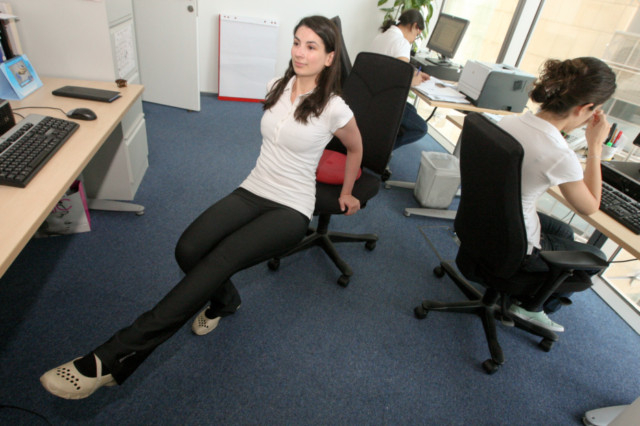Technology. It has transformed our lives beyond recognition in the past fifty years.
Face-to-face calls with loved ones who live halfway across the globe and the ability to have information at your fingertips twenty-four hours a day are just the tip of the iceberg when it comes to pushing the boundaries of human advancement.
Turn back the clock and our kids would be astonished to find that people actually had to walk to a phone to make a call or go to a library to complete a school project.
Now we can do these things from the comfort of our sofa, office chair or bed. We literally only have to lift a finger.
Progress? Well yes of course. In so many ways technology has shrunk the world for us and unlocked so many new opportunities.
However, there is always a price to pay for progress and it seems that many of us are paying with our health. Technology has increasingly allowed us to conduct our lives from the sofa and this is eroding the time we actually spend moving.
Ask yourself, how much of your day do you find yourself sitting down? Whether its because you do a deskbound job or in the evening relaxing in front of a screen or because you just can’t seem to get motivated to do anything else, it appears that sitting for long periods of time is becoming the norm these days.
Recent studies show that our sedentary lifestyles are having a detrimental impact on the quality and longevity of our lives.
Not only has sitting been linked to worsening mental health, it has also been shown to have an adverse affect on our heart health, to increase the probability of skeletal and muscle problems and is one of the key indicators in obesity issues.
If you’re slim, you might think that lets you off the hook. But that simply isn’t the case. Even if you have a body weight that is deemed to be within "healthy" guidelines, if you are physically inactive you are still at risk of premature death because of it.
In fact a large study done in the US (100,000 people) found that those sitting for over six hours a day had a 40 per cent increase in the risk of serious illness or death within the following 15 years than those who only sat for three hours a day.
These risk factors also apply to a group frequently called "active couch potatoes", who take enough regular exercise, but negate some of the health benefits by sitting down too much each day.
And it’s not just us adults that this affects either! According to a study compiled by the University of Essex UK into the effects of declining levels of activity in childhood, compared to a generation ago, our children are actually becoming weaker.
The conclusion being that the increasing amounts of time they spend sitting down using some kind of device is causing them to be carrying less muscle and more fat in their overall bodyweight. Worrying news indeed when we factor in the soaring rates of childhood obesity.
Indeed the healthy futures we want for our kids are increasingly being put in jeopardy by the sway technology has over their spare time and this should give parents real pause for thought.
Understandably, it may feel like this "sitting" issue is just another thing to add to your list of things to worry about, however it’s actually an area where a few small changes to your daily routines can have a huge impact on your long-term health.
A healthy start
And a good place to make a start is by trying to work out just how much of the time you are awake you actually spend sitting on average. This way you can identify your most sedentary times and do something about it.
It goes without saying that building in regular activity to your schedule every day is always going to be beneficial. This doesn’t have to mean donning the Lycra and taking out an expensive membership to a gym (though of course that’s great if that’s what you’re into!).
Research into the activity habits of over 334,000 men and women compiled by the University of Cambridge found that if those classed as "inactive" took a 20 minute brisk walk every day they could reduce their risk of premature death by between 16 to 30 per cent. A small and simple thing to do, but something which potentially has a huge health gain as a reward.
When it comes to work based sitting, many of us feel we have no choice in the matter. Some very progressive employers now provide desks that raise and lower to give you the choice of standing or even "treadmill desks", which keep you active as you work, but if this isn’t on offer, taking regular "moving breaks" will almost certainly help to reduce the impact of prolonged sitting.
To get into the habit: set your phone alarm every thirty to forty minutes and get up and move around for five minutes. Get up and talk to colleagues rather than relying on email and if you’re on the phone walk around.
Take the stairs not the elevator and try and build in walking to your daily commute. All of these small adaptations to your working day can pay big dividends when it comes to your health.
Catch yourself sitting in your spare time too. I know it sounds odd but sometimes you have to be objective about these things before you can change them. Stand to watch TV for some of the time or force yourself to get up and do small tasks around the house intermittently.
Where kids are concerned, share with them the risks of sitting down too much and get them to come up with fun ways of building movement into their day. Encourage daily activity and try to limit the time they spend sitting in front of a screen.
Remember, exercise doesn’t have to be formal. It’s great if you’re involved in sports, but what I’m talking about here is simply just moving more and that can be done in so many different ways, from dancing around the kitchen to an afternoon with the family at the beach playing ball. Any activity is always good for the body and is definitely good for the mind, so move more, sit less and tip the life-scales back in your favour.
About the writer
 |
Russell Hemmings is a renowned cognitive |












